BUSM3115: Corporate Governance and Ethical Relativism Analysis
VerifiedAdded on 2022/10/14
|9
|2775
|9
Report
AI Summary
This report provides an executive summary and analysis of ethical relativism within the context of a globalized world. It argues for the complexities of ethical relativism and its application within international business operations. The paper explores how globalization, cultural differences, and varying legal frameworks across nations influence ethical decision-making, specifically examining the challenges faced by multinational corporations. It delves into the core concepts of ethical and cultural relativism, providing examples like McDonald's and Nestle, and discusses the need for a balance between ethical flexibility and adherence to universal ethical standards. The report also provides recommendations for companies to establish in-house ethics teams and to clearly define the boundaries of ethical relativism. Ultimately, the paper emphasizes the importance of ethical considerations in corporate social responsibility and the need for companies to adapt to the changing ethical landscape to maintain consumer trust and uphold their reputations.
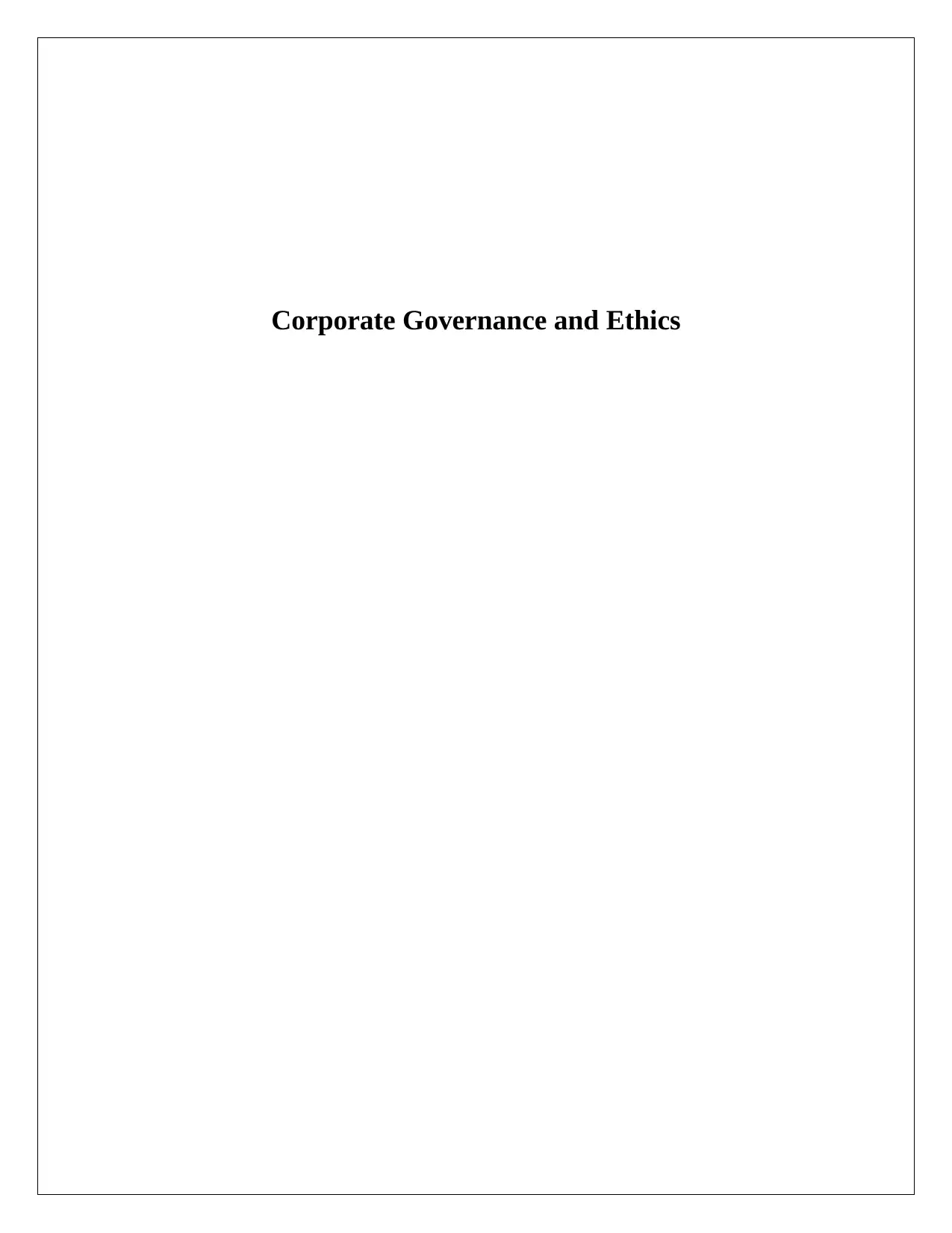
Corporate Governance and Ethics
Paraphrase This Document
Need a fresh take? Get an instant paraphrase of this document with our AI Paraphraser
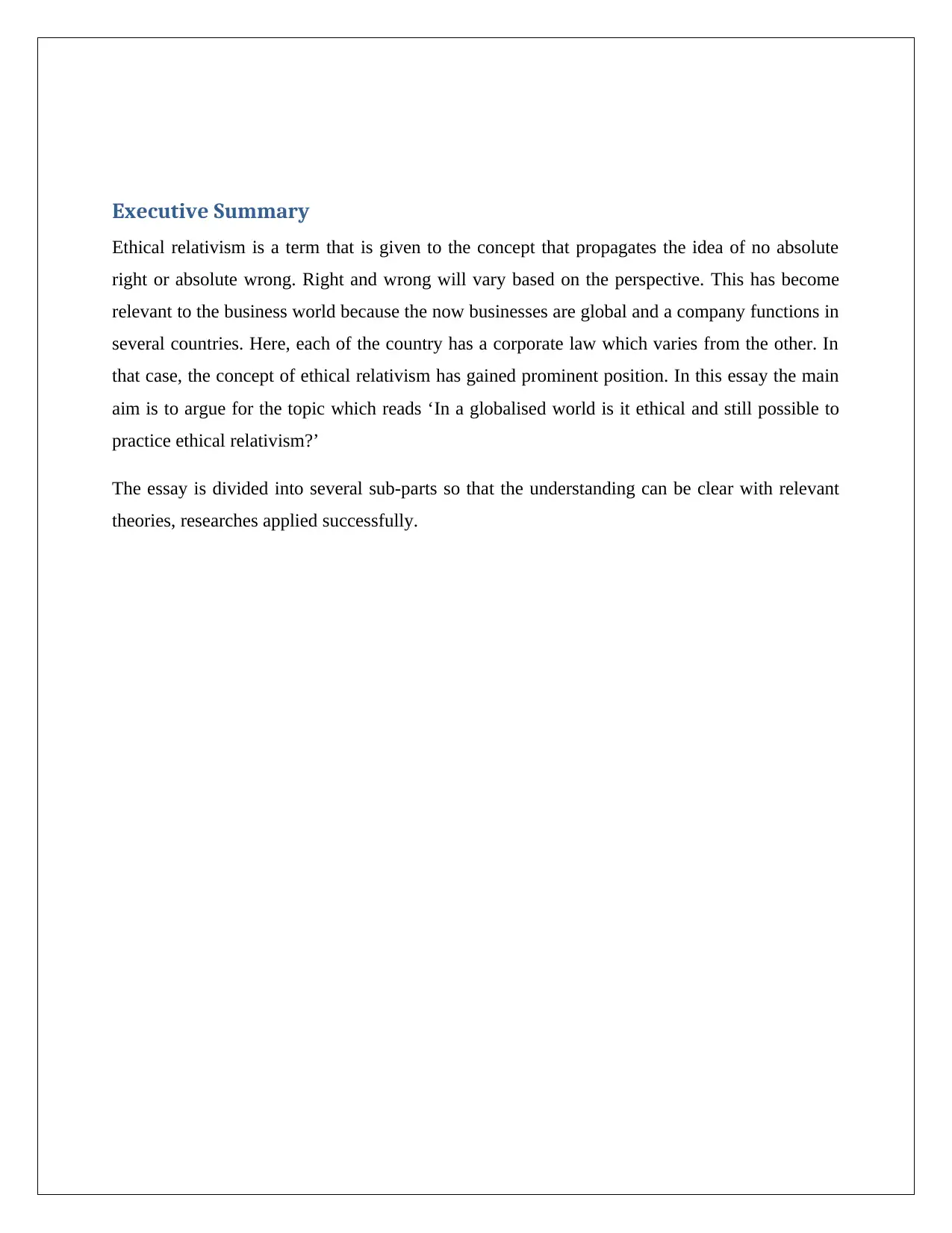
Executive Summary
Ethical relativism is a term that is given to the concept that propagates the idea of no absolute
right or absolute wrong. Right and wrong will vary based on the perspective. This has become
relevant to the business world because the now businesses are global and a company functions in
several countries. Here, each of the country has a corporate law which varies from the other. In
that case, the concept of ethical relativism has gained prominent position. In this essay the main
aim is to argue for the topic which reads ‘In a globalised world is it ethical and still possible to
practice ethical relativism?’
The essay is divided into several sub-parts so that the understanding can be clear with relevant
theories, researches applied successfully.
Ethical relativism is a term that is given to the concept that propagates the idea of no absolute
right or absolute wrong. Right and wrong will vary based on the perspective. This has become
relevant to the business world because the now businesses are global and a company functions in
several countries. Here, each of the country has a corporate law which varies from the other. In
that case, the concept of ethical relativism has gained prominent position. In this essay the main
aim is to argue for the topic which reads ‘In a globalised world is it ethical and still possible to
practice ethical relativism?’
The essay is divided into several sub-parts so that the understanding can be clear with relevant
theories, researches applied successfully.
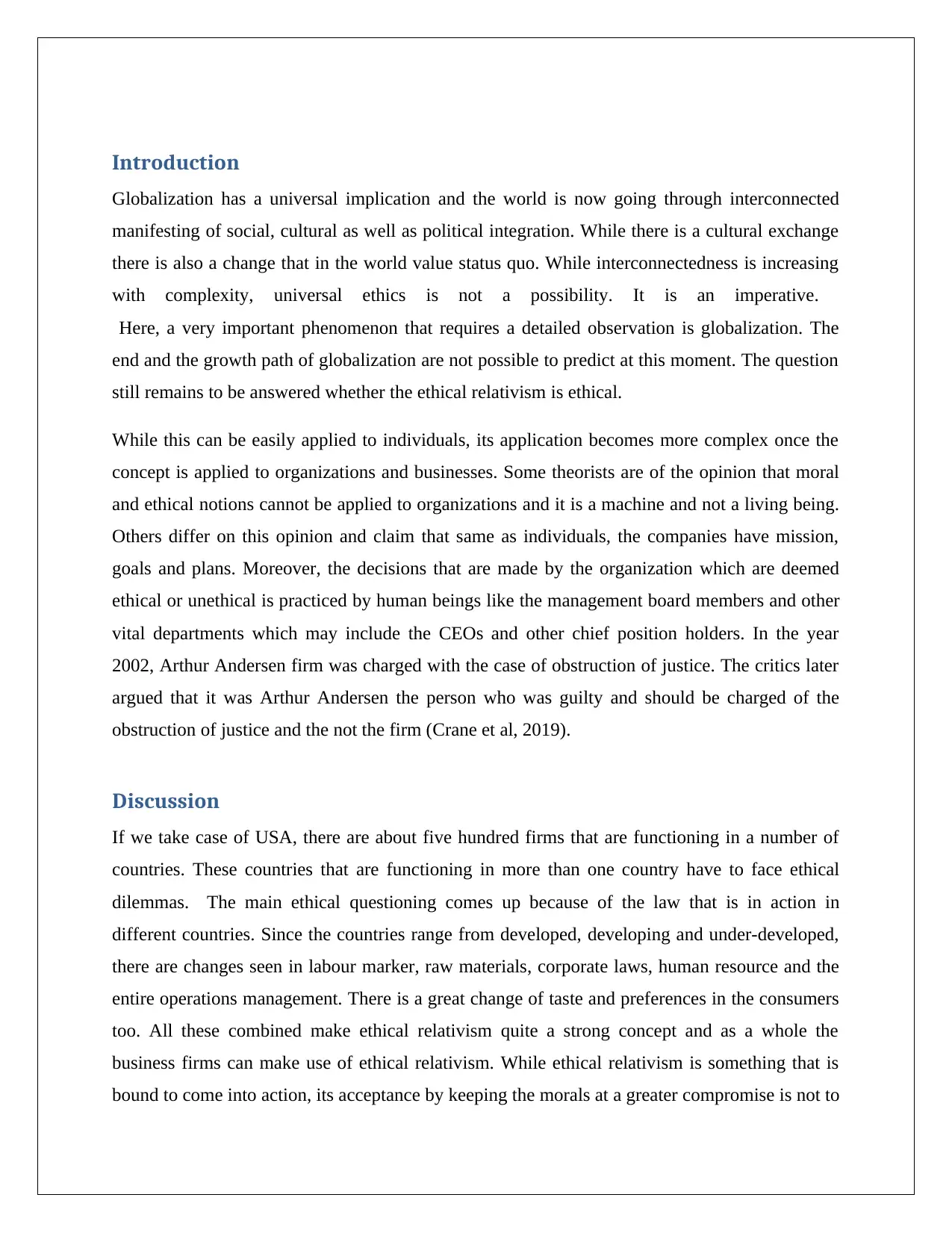
Introduction
Globalization has a universal implication and the world is now going through interconnected
manifesting of social, cultural as well as political integration. While there is a cultural exchange
there is also a change that in the world value status quo. While interconnectedness is increasing
with complexity, universal ethics is not a possibility. It is an imperative.
Here, a very important phenomenon that requires a detailed observation is globalization. The
end and the growth path of globalization are not possible to predict at this moment. The question
still remains to be answered whether the ethical relativism is ethical.
While this can be easily applied to individuals, its application becomes more complex once the
concept is applied to organizations and businesses. Some theorists are of the opinion that moral
and ethical notions cannot be applied to organizations and it is a machine and not a living being.
Others differ on this opinion and claim that same as individuals, the companies have mission,
goals and plans. Moreover, the decisions that are made by the organization which are deemed
ethical or unethical is practiced by human beings like the management board members and other
vital departments which may include the CEOs and other chief position holders. In the year
2002, Arthur Andersen firm was charged with the case of obstruction of justice. The critics later
argued that it was Arthur Andersen the person who was guilty and should be charged of the
obstruction of justice and the not the firm (Crane et al, 2019).
Discussion
If we take case of USA, there are about five hundred firms that are functioning in a number of
countries. These countries that are functioning in more than one country have to face ethical
dilemmas. The main ethical questioning comes up because of the law that is in action in
different countries. Since the countries range from developed, developing and under-developed,
there are changes seen in labour marker, raw materials, corporate laws, human resource and the
entire operations management. There is a great change of taste and preferences in the consumers
too. All these combined make ethical relativism quite a strong concept and as a whole the
business firms can make use of ethical relativism. While ethical relativism is something that is
bound to come into action, its acceptance by keeping the morals at a greater compromise is not to
Globalization has a universal implication and the world is now going through interconnected
manifesting of social, cultural as well as political integration. While there is a cultural exchange
there is also a change that in the world value status quo. While interconnectedness is increasing
with complexity, universal ethics is not a possibility. It is an imperative.
Here, a very important phenomenon that requires a detailed observation is globalization. The
end and the growth path of globalization are not possible to predict at this moment. The question
still remains to be answered whether the ethical relativism is ethical.
While this can be easily applied to individuals, its application becomes more complex once the
concept is applied to organizations and businesses. Some theorists are of the opinion that moral
and ethical notions cannot be applied to organizations and it is a machine and not a living being.
Others differ on this opinion and claim that same as individuals, the companies have mission,
goals and plans. Moreover, the decisions that are made by the organization which are deemed
ethical or unethical is practiced by human beings like the management board members and other
vital departments which may include the CEOs and other chief position holders. In the year
2002, Arthur Andersen firm was charged with the case of obstruction of justice. The critics later
argued that it was Arthur Andersen the person who was guilty and should be charged of the
obstruction of justice and the not the firm (Crane et al, 2019).
Discussion
If we take case of USA, there are about five hundred firms that are functioning in a number of
countries. These countries that are functioning in more than one country have to face ethical
dilemmas. The main ethical questioning comes up because of the law that is in action in
different countries. Since the countries range from developed, developing and under-developed,
there are changes seen in labour marker, raw materials, corporate laws, human resource and the
entire operations management. There is a great change of taste and preferences in the consumers
too. All these combined make ethical relativism quite a strong concept and as a whole the
business firms can make use of ethical relativism. While ethical relativism is something that is
bound to come into action, its acceptance by keeping the morals at a greater compromise is not to
⊘ This is a preview!⊘
Do you want full access?
Subscribe today to unlock all pages.

Trusted by 1+ million students worldwide
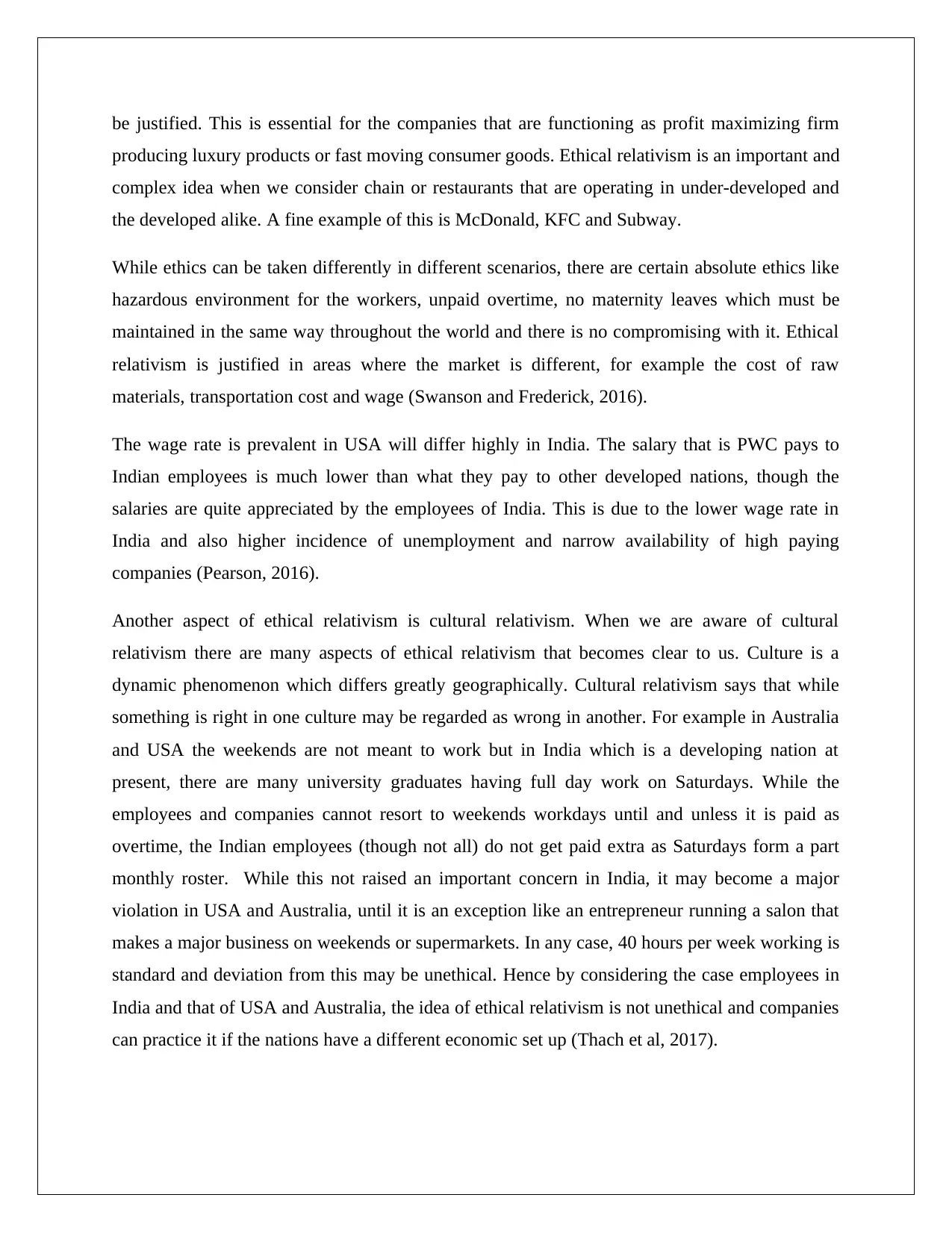
be justified. This is essential for the companies that are functioning as profit maximizing firm
producing luxury products or fast moving consumer goods. Ethical relativism is an important and
complex idea when we consider chain or restaurants that are operating in under-developed and
the developed alike. A fine example of this is McDonald, KFC and Subway.
While ethics can be taken differently in different scenarios, there are certain absolute ethics like
hazardous environment for the workers, unpaid overtime, no maternity leaves which must be
maintained in the same way throughout the world and there is no compromising with it. Ethical
relativism is justified in areas where the market is different, for example the cost of raw
materials, transportation cost and wage (Swanson and Frederick, 2016).
The wage rate is prevalent in USA will differ highly in India. The salary that is PWC pays to
Indian employees is much lower than what they pay to other developed nations, though the
salaries are quite appreciated by the employees of India. This is due to the lower wage rate in
India and also higher incidence of unemployment and narrow availability of high paying
companies (Pearson, 2016).
Another aspect of ethical relativism is cultural relativism. When we are aware of cultural
relativism there are many aspects of ethical relativism that becomes clear to us. Culture is a
dynamic phenomenon which differs greatly geographically. Cultural relativism says that while
something is right in one culture may be regarded as wrong in another. For example in Australia
and USA the weekends are not meant to work but in India which is a developing nation at
present, there are many university graduates having full day work on Saturdays. While the
employees and companies cannot resort to weekends workdays until and unless it is paid as
overtime, the Indian employees (though not all) do not get paid extra as Saturdays form a part
monthly roster. While this not raised an important concern in India, it may become a major
violation in USA and Australia, until it is an exception like an entrepreneur running a salon that
makes a major business on weekends or supermarkets. In any case, 40 hours per week working is
standard and deviation from this may be unethical. Hence by considering the case employees in
India and that of USA and Australia, the idea of ethical relativism is not unethical and companies
can practice it if the nations have a different economic set up (Thach et al, 2017).
producing luxury products or fast moving consumer goods. Ethical relativism is an important and
complex idea when we consider chain or restaurants that are operating in under-developed and
the developed alike. A fine example of this is McDonald, KFC and Subway.
While ethics can be taken differently in different scenarios, there are certain absolute ethics like
hazardous environment for the workers, unpaid overtime, no maternity leaves which must be
maintained in the same way throughout the world and there is no compromising with it. Ethical
relativism is justified in areas where the market is different, for example the cost of raw
materials, transportation cost and wage (Swanson and Frederick, 2016).
The wage rate is prevalent in USA will differ highly in India. The salary that is PWC pays to
Indian employees is much lower than what they pay to other developed nations, though the
salaries are quite appreciated by the employees of India. This is due to the lower wage rate in
India and also higher incidence of unemployment and narrow availability of high paying
companies (Pearson, 2016).
Another aspect of ethical relativism is cultural relativism. When we are aware of cultural
relativism there are many aspects of ethical relativism that becomes clear to us. Culture is a
dynamic phenomenon which differs greatly geographically. Cultural relativism says that while
something is right in one culture may be regarded as wrong in another. For example in Australia
and USA the weekends are not meant to work but in India which is a developing nation at
present, there are many university graduates having full day work on Saturdays. While the
employees and companies cannot resort to weekends workdays until and unless it is paid as
overtime, the Indian employees (though not all) do not get paid extra as Saturdays form a part
monthly roster. While this not raised an important concern in India, it may become a major
violation in USA and Australia, until it is an exception like an entrepreneur running a salon that
makes a major business on weekends or supermarkets. In any case, 40 hours per week working is
standard and deviation from this may be unethical. Hence by considering the case employees in
India and that of USA and Australia, the idea of ethical relativism is not unethical and companies
can practice it if the nations have a different economic set up (Thach et al, 2017).
Paraphrase This Document
Need a fresh take? Get an instant paraphrase of this document with our AI Paraphraser
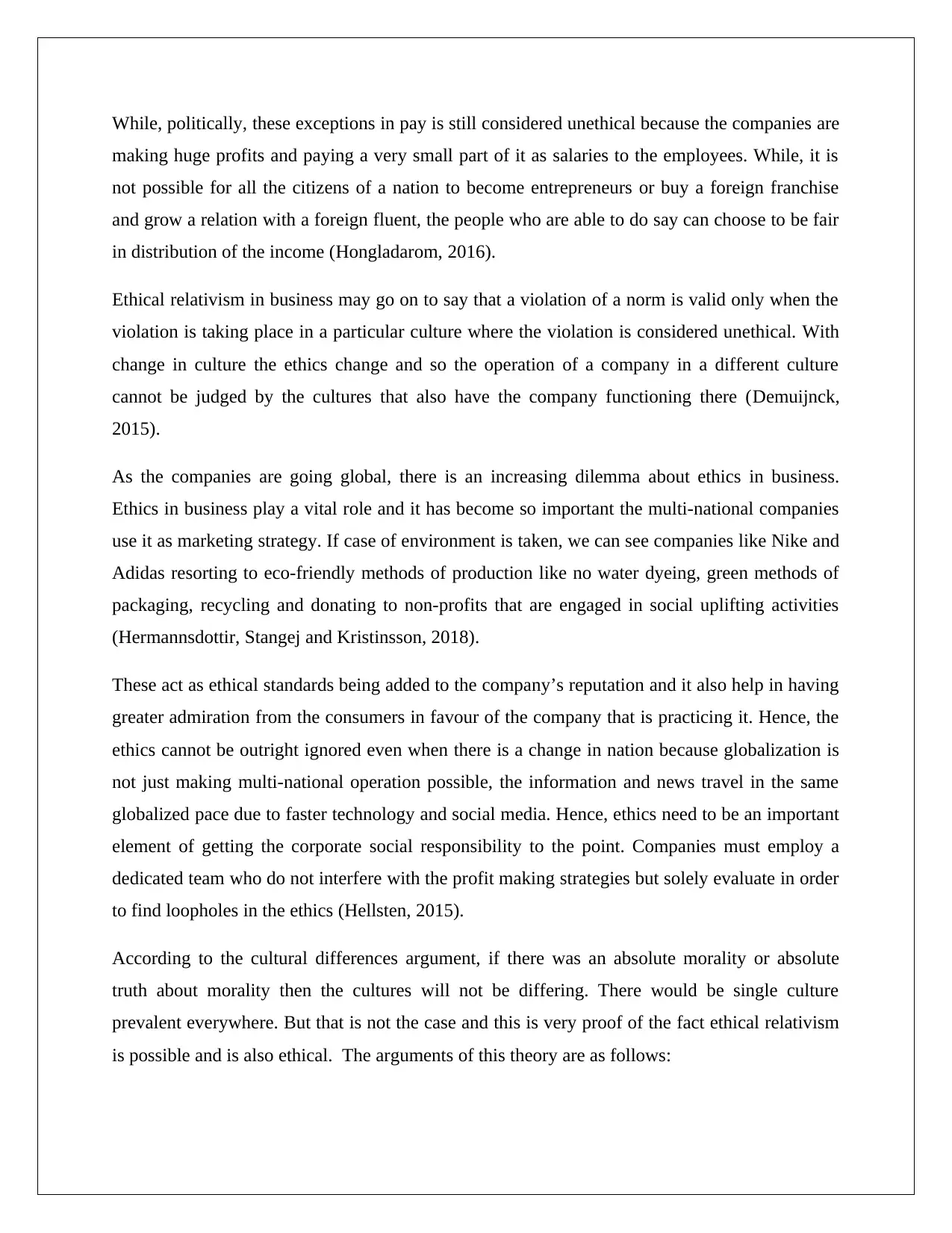
While, politically, these exceptions in pay is still considered unethical because the companies are
making huge profits and paying a very small part of it as salaries to the employees. While, it is
not possible for all the citizens of a nation to become entrepreneurs or buy a foreign franchise
and grow a relation with a foreign fluent, the people who are able to do say can choose to be fair
in distribution of the income (Hongladarom, 2016).
Ethical relativism in business may go on to say that a violation of a norm is valid only when the
violation is taking place in a particular culture where the violation is considered unethical. With
change in culture the ethics change and so the operation of a company in a different culture
cannot be judged by the cultures that also have the company functioning there (Demuijnck,
2015).
As the companies are going global, there is an increasing dilemma about ethics in business.
Ethics in business play a vital role and it has become so important the multi-national companies
use it as marketing strategy. If case of environment is taken, we can see companies like Nike and
Adidas resorting to eco-friendly methods of production like no water dyeing, green methods of
packaging, recycling and donating to non-profits that are engaged in social uplifting activities
(Hermannsdottir, Stangej and Kristinsson, 2018).
These act as ethical standards being added to the company’s reputation and it also help in having
greater admiration from the consumers in favour of the company that is practicing it. Hence, the
ethics cannot be outright ignored even when there is a change in nation because globalization is
not just making multi-national operation possible, the information and news travel in the same
globalized pace due to faster technology and social media. Hence, ethics need to be an important
element of getting the corporate social responsibility to the point. Companies must employ a
dedicated team who do not interfere with the profit making strategies but solely evaluate in order
to find loopholes in the ethics (Hellsten, 2015).
According to the cultural differences argument, if there was an absolute morality or absolute
truth about morality then the cultures will not be differing. There would be single culture
prevalent everywhere. But that is not the case and this is very proof of the fact ethical relativism
is possible and is also ethical. The arguments of this theory are as follows:
making huge profits and paying a very small part of it as salaries to the employees. While, it is
not possible for all the citizens of a nation to become entrepreneurs or buy a foreign franchise
and grow a relation with a foreign fluent, the people who are able to do say can choose to be fair
in distribution of the income (Hongladarom, 2016).
Ethical relativism in business may go on to say that a violation of a norm is valid only when the
violation is taking place in a particular culture where the violation is considered unethical. With
change in culture the ethics change and so the operation of a company in a different culture
cannot be judged by the cultures that also have the company functioning there (Demuijnck,
2015).
As the companies are going global, there is an increasing dilemma about ethics in business.
Ethics in business play a vital role and it has become so important the multi-national companies
use it as marketing strategy. If case of environment is taken, we can see companies like Nike and
Adidas resorting to eco-friendly methods of production like no water dyeing, green methods of
packaging, recycling and donating to non-profits that are engaged in social uplifting activities
(Hermannsdottir, Stangej and Kristinsson, 2018).
These act as ethical standards being added to the company’s reputation and it also help in having
greater admiration from the consumers in favour of the company that is practicing it. Hence, the
ethics cannot be outright ignored even when there is a change in nation because globalization is
not just making multi-national operation possible, the information and news travel in the same
globalized pace due to faster technology and social media. Hence, ethics need to be an important
element of getting the corporate social responsibility to the point. Companies must employ a
dedicated team who do not interfere with the profit making strategies but solely evaluate in order
to find loopholes in the ethics (Hellsten, 2015).
According to the cultural differences argument, if there was an absolute morality or absolute
truth about morality then the cultures will not be differing. There would be single culture
prevalent everywhere. But that is not the case and this is very proof of the fact ethical relativism
is possible and is also ethical. The arguments of this theory are as follows:
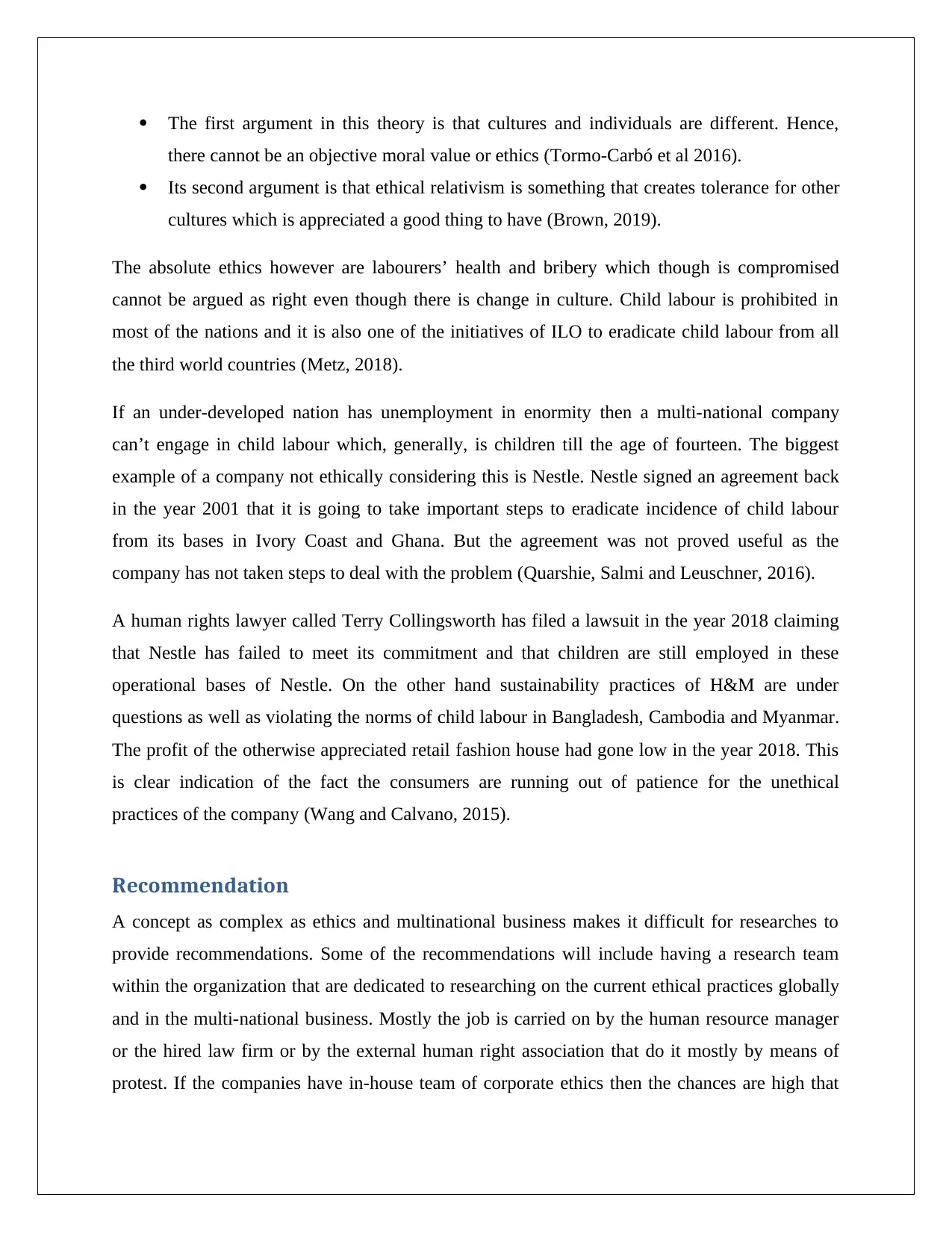
The first argument in this theory is that cultures and individuals are different. Hence,
there cannot be an objective moral value or ethics (Tormo-Carbó et al 2016).
Its second argument is that ethical relativism is something that creates tolerance for other
cultures which is appreciated a good thing to have (Brown, 2019).
The absolute ethics however are labourers’ health and bribery which though is compromised
cannot be argued as right even though there is change in culture. Child labour is prohibited in
most of the nations and it is also one of the initiatives of ILO to eradicate child labour from all
the third world countries (Metz, 2018).
If an under-developed nation has unemployment in enormity then a multi-national company
can’t engage in child labour which, generally, is children till the age of fourteen. The biggest
example of a company not ethically considering this is Nestle. Nestle signed an agreement back
in the year 2001 that it is going to take important steps to eradicate incidence of child labour
from its bases in Ivory Coast and Ghana. But the agreement was not proved useful as the
company has not taken steps to deal with the problem (Quarshie, Salmi and Leuschner, 2016).
A human rights lawyer called Terry Collingsworth has filed a lawsuit in the year 2018 claiming
that Nestle has failed to meet its commitment and that children are still employed in these
operational bases of Nestle. On the other hand sustainability practices of H&M are under
questions as well as violating the norms of child labour in Bangladesh, Cambodia and Myanmar.
The profit of the otherwise appreciated retail fashion house had gone low in the year 2018. This
is clear indication of the fact the consumers are running out of patience for the unethical
practices of the company (Wang and Calvano, 2015).
Recommendation
A concept as complex as ethics and multinational business makes it difficult for researches to
provide recommendations. Some of the recommendations will include having a research team
within the organization that are dedicated to researching on the current ethical practices globally
and in the multi-national business. Mostly the job is carried on by the human resource manager
or the hired law firm or by the external human right association that do it mostly by means of
protest. If the companies have in-house team of corporate ethics then the chances are high that
there cannot be an objective moral value or ethics (Tormo-Carbó et al 2016).
Its second argument is that ethical relativism is something that creates tolerance for other
cultures which is appreciated a good thing to have (Brown, 2019).
The absolute ethics however are labourers’ health and bribery which though is compromised
cannot be argued as right even though there is change in culture. Child labour is prohibited in
most of the nations and it is also one of the initiatives of ILO to eradicate child labour from all
the third world countries (Metz, 2018).
If an under-developed nation has unemployment in enormity then a multi-national company
can’t engage in child labour which, generally, is children till the age of fourteen. The biggest
example of a company not ethically considering this is Nestle. Nestle signed an agreement back
in the year 2001 that it is going to take important steps to eradicate incidence of child labour
from its bases in Ivory Coast and Ghana. But the agreement was not proved useful as the
company has not taken steps to deal with the problem (Quarshie, Salmi and Leuschner, 2016).
A human rights lawyer called Terry Collingsworth has filed a lawsuit in the year 2018 claiming
that Nestle has failed to meet its commitment and that children are still employed in these
operational bases of Nestle. On the other hand sustainability practices of H&M are under
questions as well as violating the norms of child labour in Bangladesh, Cambodia and Myanmar.
The profit of the otherwise appreciated retail fashion house had gone low in the year 2018. This
is clear indication of the fact the consumers are running out of patience for the unethical
practices of the company (Wang and Calvano, 2015).
Recommendation
A concept as complex as ethics and multinational business makes it difficult for researches to
provide recommendations. Some of the recommendations will include having a research team
within the organization that are dedicated to researching on the current ethical practices globally
and in the multi-national business. Mostly the job is carried on by the human resource manager
or the hired law firm or by the external human right association that do it mostly by means of
protest. If the companies have in-house team of corporate ethics then the chances are high that
⊘ This is a preview!⊘
Do you want full access?
Subscribe today to unlock all pages.

Trusted by 1+ million students worldwide
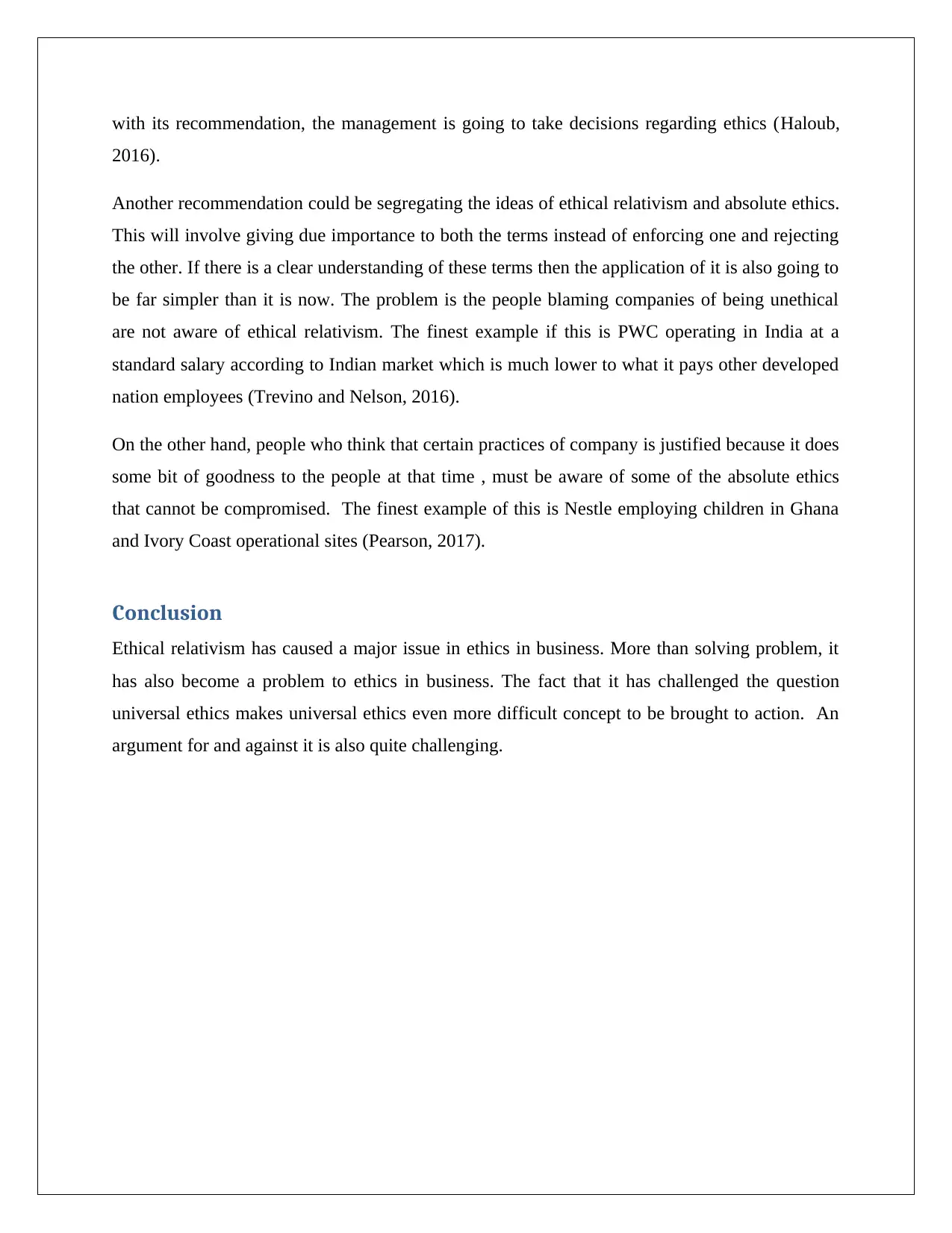
with its recommendation, the management is going to take decisions regarding ethics (Haloub,
2016).
Another recommendation could be segregating the ideas of ethical relativism and absolute ethics.
This will involve giving due importance to both the terms instead of enforcing one and rejecting
the other. If there is a clear understanding of these terms then the application of it is also going to
be far simpler than it is now. The problem is the people blaming companies of being unethical
are not aware of ethical relativism. The finest example if this is PWC operating in India at a
standard salary according to Indian market which is much lower to what it pays other developed
nation employees (Trevino and Nelson, 2016).
On the other hand, people who think that certain practices of company is justified because it does
some bit of goodness to the people at that time , must be aware of some of the absolute ethics
that cannot be compromised. The finest example of this is Nestle employing children in Ghana
and Ivory Coast operational sites (Pearson, 2017).
Conclusion
Ethical relativism has caused a major issue in ethics in business. More than solving problem, it
has also become a problem to ethics in business. The fact that it has challenged the question
universal ethics makes universal ethics even more difficult concept to be brought to action. An
argument for and against it is also quite challenging.
2016).
Another recommendation could be segregating the ideas of ethical relativism and absolute ethics.
This will involve giving due importance to both the terms instead of enforcing one and rejecting
the other. If there is a clear understanding of these terms then the application of it is also going to
be far simpler than it is now. The problem is the people blaming companies of being unethical
are not aware of ethical relativism. The finest example if this is PWC operating in India at a
standard salary according to Indian market which is much lower to what it pays other developed
nation employees (Trevino and Nelson, 2016).
On the other hand, people who think that certain practices of company is justified because it does
some bit of goodness to the people at that time , must be aware of some of the absolute ethics
that cannot be compromised. The finest example of this is Nestle employing children in Ghana
and Ivory Coast operational sites (Pearson, 2017).
Conclusion
Ethical relativism has caused a major issue in ethics in business. More than solving problem, it
has also become a problem to ethics in business. The fact that it has challenged the question
universal ethics makes universal ethics even more difficult concept to be brought to action. An
argument for and against it is also quite challenging.
Paraphrase This Document
Need a fresh take? Get an instant paraphrase of this document with our AI Paraphraser
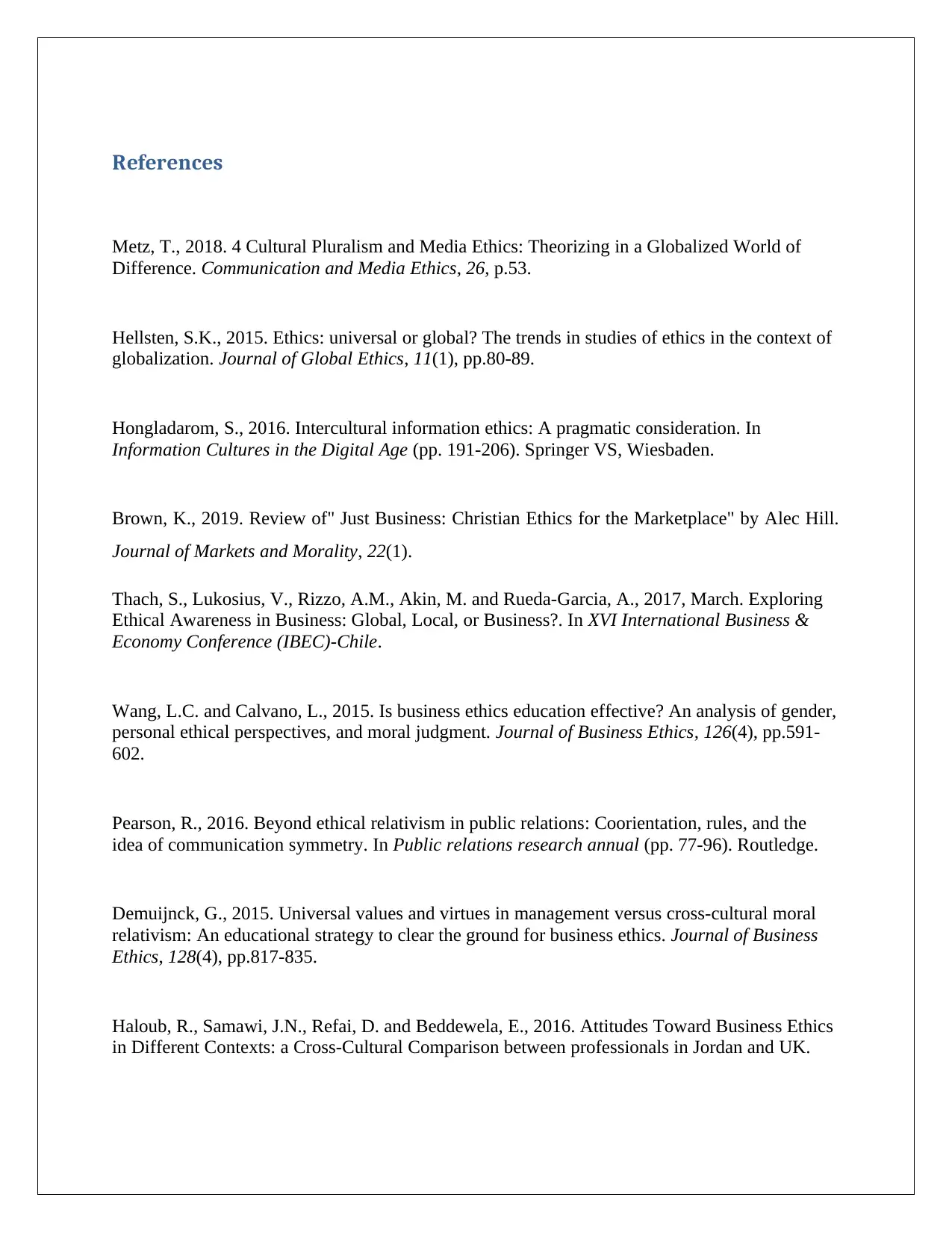
References
Metz, T., 2018. 4 Cultural Pluralism and Media Ethics: Theorizing in a Globalized World of
Difference. Communication and Media Ethics, 26, p.53.
Hellsten, S.K., 2015. Ethics: universal or global? The trends in studies of ethics in the context of
globalization. Journal of Global Ethics, 11(1), pp.80-89.
Hongladarom, S., 2016. Intercultural information ethics: A pragmatic consideration. In
Information Cultures in the Digital Age (pp. 191-206). Springer VS, Wiesbaden.
Brown, K., 2019. Review of" Just Business: Christian Ethics for the Marketplace" by Alec Hill.
Journal of Markets and Morality, 22(1).
Thach, S., Lukosius, V., Rizzo, A.M., Akin, M. and Rueda-Garcia, A., 2017, March. Exploring
Ethical Awareness in Business: Global, Local, or Business?. In XVI International Business &
Economy Conference (IBEC)-Chile.
Wang, L.C. and Calvano, L., 2015. Is business ethics education effective? An analysis of gender,
personal ethical perspectives, and moral judgment. Journal of Business Ethics, 126(4), pp.591-
602.
Pearson, R., 2016. Beyond ethical relativism in public relations: Coorientation, rules, and the
idea of communication symmetry. In Public relations research annual (pp. 77-96). Routledge.
Demuijnck, G., 2015. Universal values and virtues in management versus cross-cultural moral
relativism: An educational strategy to clear the ground for business ethics. Journal of Business
Ethics, 128(4), pp.817-835.
Haloub, R., Samawi, J.N., Refai, D. and Beddewela, E., 2016. Attitudes Toward Business Ethics
in Different Contexts: a Cross-Cultural Comparison between professionals in Jordan and UK.
Metz, T., 2018. 4 Cultural Pluralism and Media Ethics: Theorizing in a Globalized World of
Difference. Communication and Media Ethics, 26, p.53.
Hellsten, S.K., 2015. Ethics: universal or global? The trends in studies of ethics in the context of
globalization. Journal of Global Ethics, 11(1), pp.80-89.
Hongladarom, S., 2016. Intercultural information ethics: A pragmatic consideration. In
Information Cultures in the Digital Age (pp. 191-206). Springer VS, Wiesbaden.
Brown, K., 2019. Review of" Just Business: Christian Ethics for the Marketplace" by Alec Hill.
Journal of Markets and Morality, 22(1).
Thach, S., Lukosius, V., Rizzo, A.M., Akin, M. and Rueda-Garcia, A., 2017, March. Exploring
Ethical Awareness in Business: Global, Local, or Business?. In XVI International Business &
Economy Conference (IBEC)-Chile.
Wang, L.C. and Calvano, L., 2015. Is business ethics education effective? An analysis of gender,
personal ethical perspectives, and moral judgment. Journal of Business Ethics, 126(4), pp.591-
602.
Pearson, R., 2016. Beyond ethical relativism in public relations: Coorientation, rules, and the
idea of communication symmetry. In Public relations research annual (pp. 77-96). Routledge.
Demuijnck, G., 2015. Universal values and virtues in management versus cross-cultural moral
relativism: An educational strategy to clear the ground for business ethics. Journal of Business
Ethics, 128(4), pp.817-835.
Haloub, R., Samawi, J.N., Refai, D. and Beddewela, E., 2016. Attitudes Toward Business Ethics
in Different Contexts: a Cross-Cultural Comparison between professionals in Jordan and UK.
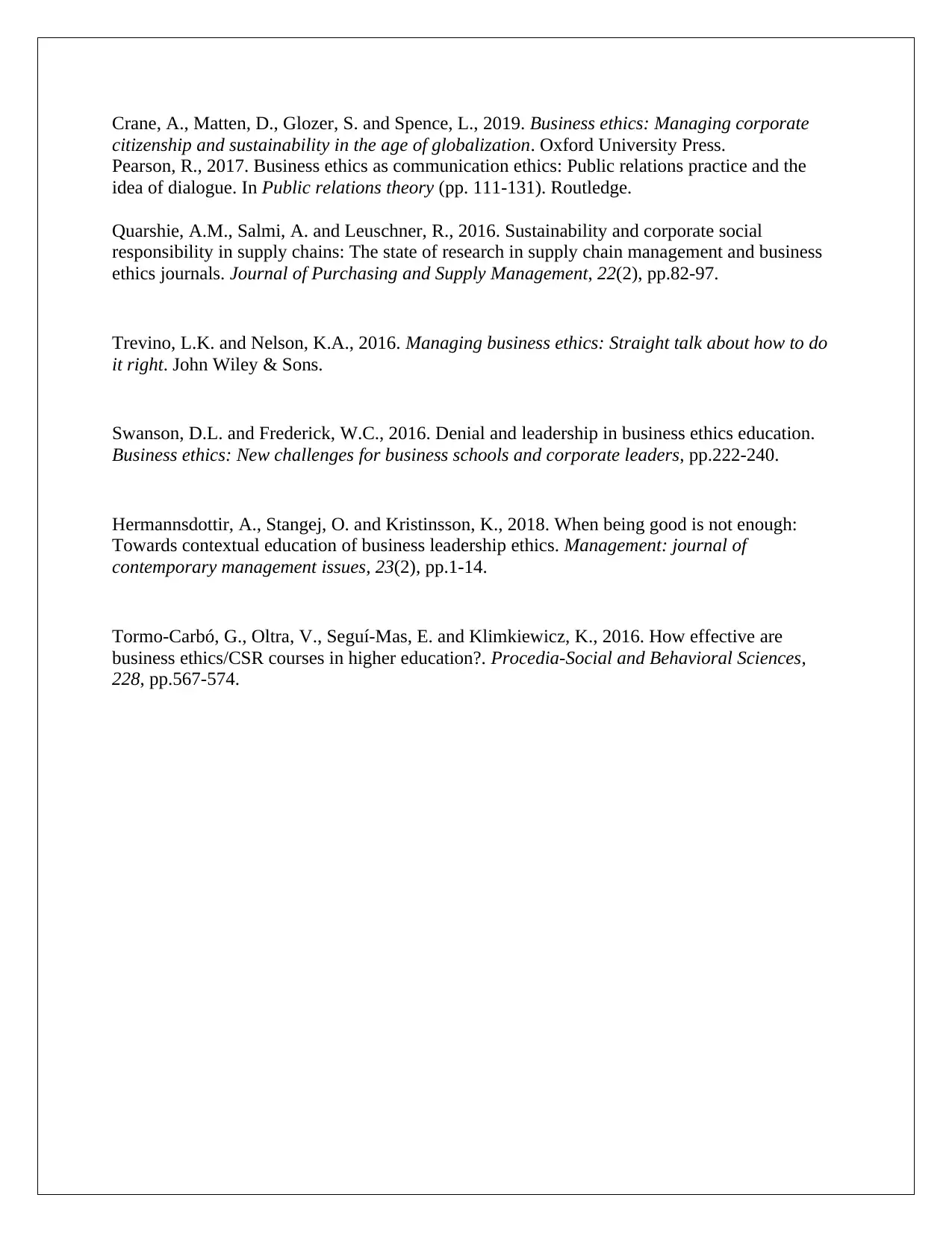
Crane, A., Matten, D., Glozer, S. and Spence, L., 2019. Business ethics: Managing corporate
citizenship and sustainability in the age of globalization. Oxford University Press.
Pearson, R., 2017. Business ethics as communication ethics: Public relations practice and the
idea of dialogue. In Public relations theory (pp. 111-131). Routledge.
Quarshie, A.M., Salmi, A. and Leuschner, R., 2016. Sustainability and corporate social
responsibility in supply chains: The state of research in supply chain management and business
ethics journals. Journal of Purchasing and Supply Management, 22(2), pp.82-97.
Trevino, L.K. and Nelson, K.A., 2016. Managing business ethics: Straight talk about how to do
it right. John Wiley & Sons.
Swanson, D.L. and Frederick, W.C., 2016. Denial and leadership in business ethics education.
Business ethics: New challenges for business schools and corporate leaders, pp.222-240.
Hermannsdottir, A., Stangej, O. and Kristinsson, K., 2018. When being good is not enough:
Towards contextual education of business leadership ethics. Management: journal of
contemporary management issues, 23(2), pp.1-14.
Tormo-Carbó, G., Oltra, V., Seguí-Mas, E. and Klimkiewicz, K., 2016. How effective are
business ethics/CSR courses in higher education?. Procedia-Social and Behavioral Sciences,
228, pp.567-574.
citizenship and sustainability in the age of globalization. Oxford University Press.
Pearson, R., 2017. Business ethics as communication ethics: Public relations practice and the
idea of dialogue. In Public relations theory (pp. 111-131). Routledge.
Quarshie, A.M., Salmi, A. and Leuschner, R., 2016. Sustainability and corporate social
responsibility in supply chains: The state of research in supply chain management and business
ethics journals. Journal of Purchasing and Supply Management, 22(2), pp.82-97.
Trevino, L.K. and Nelson, K.A., 2016. Managing business ethics: Straight talk about how to do
it right. John Wiley & Sons.
Swanson, D.L. and Frederick, W.C., 2016. Denial and leadership in business ethics education.
Business ethics: New challenges for business schools and corporate leaders, pp.222-240.
Hermannsdottir, A., Stangej, O. and Kristinsson, K., 2018. When being good is not enough:
Towards contextual education of business leadership ethics. Management: journal of
contemporary management issues, 23(2), pp.1-14.
Tormo-Carbó, G., Oltra, V., Seguí-Mas, E. and Klimkiewicz, K., 2016. How effective are
business ethics/CSR courses in higher education?. Procedia-Social and Behavioral Sciences,
228, pp.567-574.
⊘ This is a preview!⊘
Do you want full access?
Subscribe today to unlock all pages.

Trusted by 1+ million students worldwide
1 out of 9
Your All-in-One AI-Powered Toolkit for Academic Success.
+13062052269
info@desklib.com
Available 24*7 on WhatsApp / Email
![[object Object]](/_next/static/media/star-bottom.7253800d.svg)
Unlock your academic potential
Copyright © 2020–2025 A2Z Services. All Rights Reserved. Developed and managed by ZUCOL.